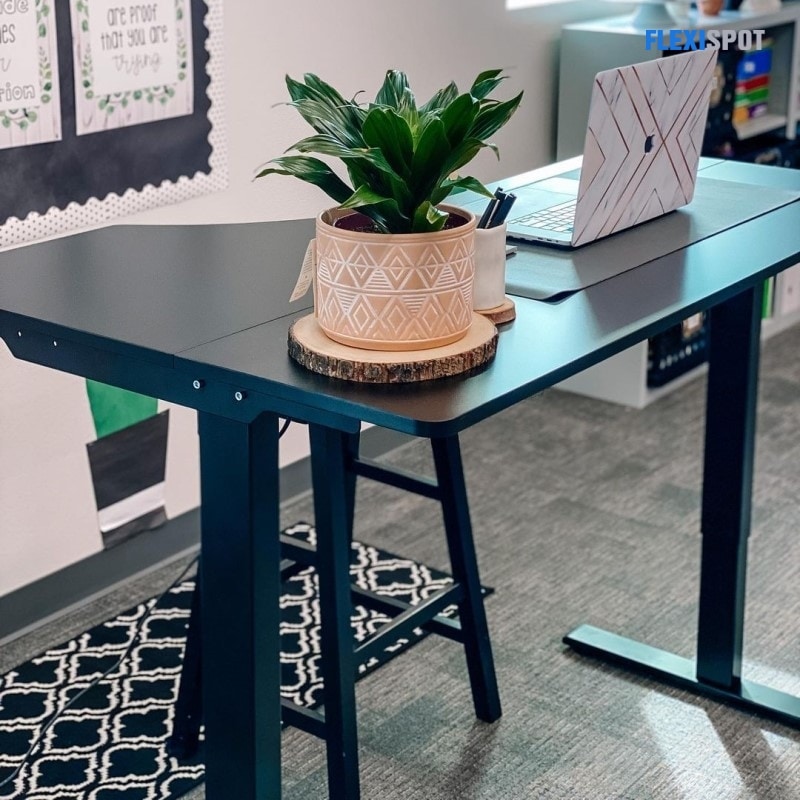Working from home has numerous environmental advantages. This adjustment has resulted in less pollution, better air quality, and lower global carbon dioxide emissions. You have participated in this good influence on the environment by avoiding making your daily commute, travelling to meetings, and attending conferences in person – and instead adopting the newest video conferencing and online meeting solutions. Of course, spending more time at home will affect your household carbon footprint. Here are some suggestions to save energy and lower your environmental impact (as well as your energy expenditures) when working from home.
A Bright Workspace
It's tricky to choose a location in your home to work from. Primarily it may not be something you're used to doing. Finding a very well-lit area by natural light is an energy-efficient alternative when it comes to the workstation. An area flooded with free natural light eliminates the need to purchase and maintain a desk lamp for most of the day.
Thermostat Regulation
We understand the impulse to crank up the heat when it's -12 degrees outside in the dead of winter or crank up the air conditioning in the sweltering summer heat. On cooler days, keep an eye on your temperature management. Purchasing a smart thermostat will also help you save energy and money. A 1°C decrease in set temperature is expected to save up to 8% on heating expenditures. You may discover that you don't have to use your heating at all, especially if you can work from a spot that is typically at a suitable temperature.
Eco-Friendly Food Businesses
If you must order lunch, choose eco-friendly establishments and tip your delivery drivers generously. An ideal alternative is to go to the nearest establishment, eco-friendly if possible, where you can get your food and pick it up yourself. This eliminates the need for a delivery service vehicle to travel to you, saves you a bit from a delivery fee, and provides an opportunity for you to stretch out and take a quick walk during your cooped-up WFH workdays.
Skip Plastic Bottles
Avoid purchasing and ordering beverages in plastic bottles to go with your lunch takeaway as much as possible. One of the best benefits of working from home is having a workplace just a few steps away from the kitchen, where you may prepare your drink or simply have water. Bring your reusables and get your drink poured into them if necessary.
Unplug
When electronic equipment is hooked but not in use, they still use energy. Everything that is plugged in consumes electricity from the network, putting undue stress on the environment. Start by disconnecting electrical gadgets that aren't in use to increase sustainability while working remotely. This could imply unplugging your mobile phone, coffee machine, microwave, laptop, or television when not in use.
Cut Down on Printing
That colourful itinerary is adorable, but do you really have to print it? Most likely not. Reduce printing by asking yourself if it is truly necessary.
Fix Doors and Windows
Reduced heat loss is among the most significant ways to minimize your heating expenditure. The most straightforward approach to address this is to seal the gaps where warm air is escaping. Draughty windows and doors can be quickly and cheaply repaired — often with supplies you already have laying around the house or shed, such as sealants, brush strips, and foam tapes.
Bamboo Products
It is critical to choose office supplies that keep you comfy, productive and organized. However, many office products are composed of plastic or other environmentally hazardous materials. Using bamboo-based materials is much better for the environment. Bamboo decomposes faster than plastic while remaining just as strong.
Decrease Screen Brightness
Dimming the brightness of your monitor screen could save up to 20% of its energy. Less energy means less environmental stress.
Eco-Friendly Office Supplies
The average office worker generates roughly 2 pounds of waste every day. Fortunately, today's products can assist us in increasing our efficiency. The secret is to use biodegradable office materials.
- Use paperless notebooks as a popular alternative among our readers.
- If you really must have a business card, make it sustainable. It is beneficial to the environment and acts as a reminder that you are concerned about waste.
- Any office worker must have a decent pen. Discarding plastic pens, on the other hand, can be harmful to the environment. Biodegradable pens manufactured from recycled materials are a more environmentally friendly option.
Sustainable Food
Since you have some spare time in the evening due to a reduction in travel time, you may use it to sample some new and different dishes. Reduced meat intake is one of the most notable acts an individual can do to lessen their carbon footprint.
Buy Pre-Owned
Look for an eco-friendly and cost-effective alternative for outfitting your home workspace with all of the necessary supplies. There are numerous secondhand items to choose from, ranging from office furniture to refurbished laptops. Don't always go out and get something brand new.
Smart and Flexible Work
Is your energy provider charging you different costs at varying times of the day? If this is the case, why not enjoy the benefits of it by working more during the off-hours, when your energy expenditures are likely to be lower, and less during peak hours, when power is at a premium.
Heating Controls
If you're not used to working at home throughout the day, you should better use your heating settings, such as turning off radiators in spaces where you won't be working. It's pointless to heat your entire house if you're going to be spending the majority of your time in one place. If you do not commute, you may discover that you have gained an extra hour in bed every morning. That means you can even program your heating to turn on an hour later.
Green Buddies
Adorn your desk with a small plant. It's a creative technique to repurpose bottles or paper boxes to grow a small plant. When it becomes too large for the workspace, replant it in your backyard garden. Furthermore, plants make us more productive, less stressed, and more focused. The more plants around your home, the better!
Non-Toxic Cleaning Supplies
Non-toxic cleaning agents enhance indoor air quality and are also often created from sustainable or recycled resources, reducing waste significantly. Explore the cleansing properties of non-toxic cleaning solutions such as baking soda or lemons.
Cut Waste and Recycle
Spending much more time at home means producing more waste and discarding it through your home waste collection and disposal rather than at the workplace. As a result, it's worth taking advantage of this opportunity to become acquainted with your local council's recycling guidelines. It could also be an opportunity to reduce throwaway or takeout packaging by preparing home-cooked meals, ideally using up leftovers.
Examine your daily routine and consider what you could do differently. There are numerous modest actions you can take to make working at home more sustainable.


